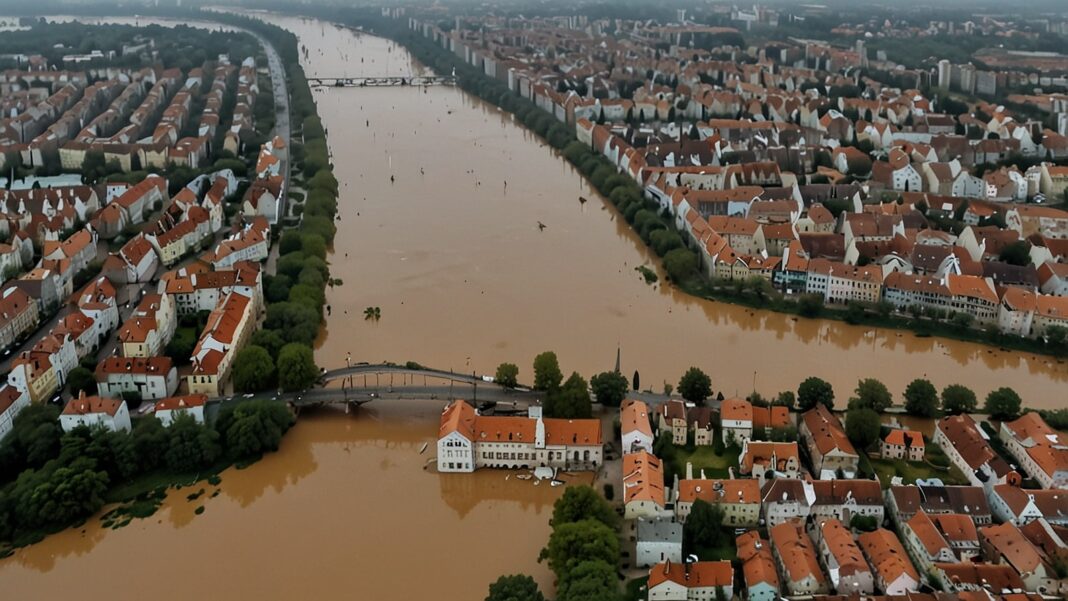Central Europe is still recovering after record-breaking floods that have so far killed at least 37 people and displaced tens of thousands in Poland, the Czech Republic, Austria, and Romania. Torrential rains, which are once-a-century occurrences, have flooded rivers, felled trees and caused mass evacuations, topping world headlines and search trends.
The catastrophe, made worse by climate change, has triggered the immediate action of demanding stronger environmental policies and emergency response, with search engine queries such as Europe floods 2025 and Central Europe floods ” skyrocketing on Google.
The flood, which is the result of a low-pressure system dumping weeks of rainfall in a few days, has overwhelmed infrastructure, making Wroclaw in Poland and Ostrava in the Czech Republic among the worst-hit regions.
Thousands of people have been caught in darkness due to power cuts, and homes, bridges, and roads have been washed away. The European Union has deployed rapid-response units, and social media sites, such as X, are filled with photos of flooded villages and requests for help, thereby increasing the impact of the crisis.
Devastation Across Borders
The Oder River overran in Poland, with Wroclaw and adjacent villages being flooded, killing 12 people and evacuating 15,000. The Czech Republic registered 10 deaths, and Ostrava’s historic centre was flooded, and thousands of people were trapped in temporary houses.
In Austria, seven people died in the Lower Austria region when the Danube River overtopped its banks. In the eastern counties of Romania, eight were killed, as whole settlements were overwhelmed in mudslides. There is a shortage of emergency services; helicopters and boats are used to save people who are stuck on rooftops.
The crop, livestock and infrastructure are destroyed by the floods whose damages amount to billions of euros. In Poland, Prime Minister Donald Tusk declared the state of emergency and promised to provide relief funds immediately and request assistance of EU.
The Czech government has responded to the call, with Prime Minister Petr Fiala attributing the calamity to climate change. This is a wake-up call,” said Fiala, as the trend in online searches for climate change in Europe soared, with people becoming increasingly concerned about the extreme weather occurrences.
EU Response and Climate Debate
The European Union has moved promptly, with Commission President Ursula von der Leyen declaring EUR500 million in emergency intervention on a trip to flood-afflicted Poland on August 29.
The Copernicus Climate Change Service of the EU confirmed the claim of global warming, which has increased rainfall due to warmer weather conditions, a subject of debate in climate policy.
Green MEPs are advocating faster renewable energy conversions, and opponents of the EU’s Green Deal claim that the economic burdens of their strategy exert a strain on regions at risk. The increasing number of searches for the terms’ EU climate policy 2025′ and ‘Europe flood aid’ highlights the political and environmental stakes of the crisis.
Hashtags such as #EuropeFloods and # ClimateCrisis have gone viral on X, with users uploading footage of raging rivers and volunteers distributing supplies. The catastrophe has also prompted a resurgence in the debate about the ageing infrastructure in Europe, which cannot withstand extreme weather.
In Austria, Chancellor Karl Nehammer proposed a EUR2 billion budget on flood defences, which was gaining momentum as the trend of European flood infrastructure takes up the internet.
Human Toll and Community Resilience
The human price is enormous, and tales of loss dominate the news circuits. In Romania, four people died in a family when the house collapsed due to a mudslide, and a schoolteacher lost his life in the Czech Republic while rescuing schoolchildren who were trapped in a flooded school.
Yet, amid the tragedy, tales of resilience emerge. Human chains of volunteers are being organised to deliver food and blankets in Poland, and the Czech communities are crowdfunding house reconstruction. Such initiatives, which are disseminated online, have increased the rates of searches for ‘Europe flood relief 2025’ and ‘Central Europe flood volunteers’.
More than 50,000 people have been displaced, and temporary shelters are overflowing because of the floods. Health officials are concerned about waterborne diseases and psychological trauma, which leads to the need to support in the long-term.
The Red Cross and other local NGOs have organised donation campaigns, and links are being shared on social media, which is further stimulating the search for terms such as ‘Europe flood donations’.
Global Attention and Future Challenges
The floods have already garnered international attention, and the United Nations has provided technical support. The United States has also pledged to provide humanitarian aid. The crisis has also heightened Europe’s focus on climate preparedness, and analysts have cautioned that such occurrences will likely become more frequent.
Recently, a Copernicus report indicated that extreme weather events increased by 20 per cent in Europe over the last 10 years, a fact that drives the curious query of Europe’s climate change 2025.
The floods are about to keep Central Europe at the top of the list of stories as the region embarks on the long road to recovery, and Google searches show that people around the world are interested in the topic, with searches of Central Europe floods 2025 and Europe climate disaster.
The EU is struggling between providing short-term relief and long-term climate investment, and impacted communities are seeking accountability. The extent of the crisis, its impact on people, and its political consequences make it reverberate on social media, ensuring it ranks at the top of the Google news ranking.
In Wroclaw, people walk in knee-deep water, promising to restructure. We have seen floods here before, but this is not it, one local said, and that was the feeling around the district. The reaction of Central Europe and the planet to the receding waters will create a narrative, and this story will remain in the conscience of the world.
